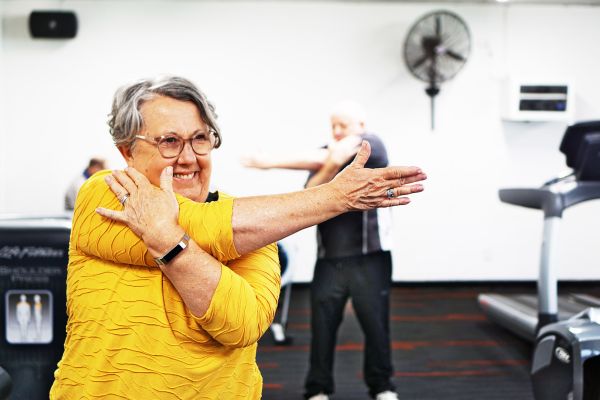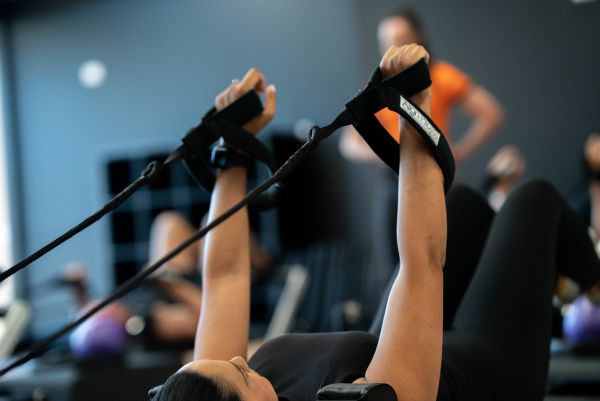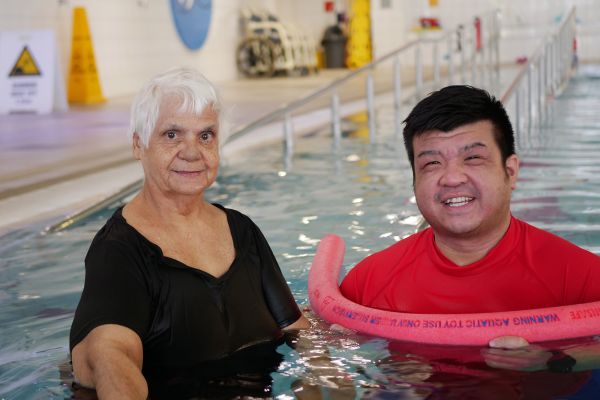Clinical exercise groups at the Y
Clinical Exercise Group sessions are led by our Allied Health professionals to ensure your safety and effectiveness as you exercise, while helping you achieve your health goals. These groups provide close supervision of exercise, education, and support with lifestyle related behaviour changes.
An initial assessment is required prior to entry into group exercise classes, to design a program that best suits your health needs and to establish your goals.
Accountability
Enjoy accountability and support while exercising in a small group environment.
Small group classes
Our clinical exercise groups are capped so we can closely monitor your progress.
Eligible for funding
You may be eligible for rebates through private health, Medicare, NDIS, RTWSA, CTP, DVA, or HCP.

Gym-based clinical exercise groups
Clinical Exercise Groups are run by our YMCA’s Allied Health professionals to closely monitor your response to exercise.
Gym-based Clinical Exercise Groups provide an opportunity to practice exercising safely, in a fun and motivating environment while achieving the correct exercise dose and advice for your health concern.

Clinical reformer Pilates
YMCA Clinical Pilates classes are conducted by qualified health professionals. They involve closely supervised, low impact exercises using reformers and focus on retraining specific movements in a gentle and controlled manner.
Unlike a regular Pilates class where participants all perform the same general program, Clinical Pilates aims to provide a more individualised approach to your treatment and goals.

Hydrotherapy clinical exercise groups
Clients often find exercise more comfortable and enjoyable in water and may experience greater range of movement in their joints.
Hydrotherapy clinical exercise groups combine the benefits of a tailored water-based exercise program with close supervision and advice from a YMCA allied health professional.
Clinical exercise groups may be suitable for the following conditions
Exercise is a safe and effective treatment for patients with coronary heart disease. Research shows regular, moderate exercise prevents the blood vessels from narrowing further, prevents blood clotting, helps deliver blood to the heart, and helps to maintain a normal heart rhythm.
Not only does exercise reduce load on the heart, it improves physical function and wellbeing, plus produces favourable changes in blood pressure, Insulin sensitivity and HDL cholesterol.
Studies show that exercise helps prevent or delay the onset of Type 2 Diabetes (T2DM) and improves control of blood glucose. Exercise also decreases the proportion of body fat, lowers the risk of heart disease and increases heart and lung fitness in people with T2DM.
Exercise has been proven to relieve symptoms of arthritis just as well as pain medications in many people, but with fewer side effects. In arthritis sufferers, exercise often reduces pain, increases muscle strength to support and stabilise affected joints and improve balance. Losing weight to reduce load on sore joints and improving functional capacity to do daily tasks also benefits wellbeing, sleep and mood.
Evidence shows that exercise, in conjunction with medication, can reduce Parkinsons’ symptoms, improve mobility, muscle strength and balance, reduce falls and may even slow progression of the disease. Positive effects on mood, cognition, fatigue, pain, sleep, constipation and active participation in the management of their disease are other benefits for Parkinson’s sufferers.
A combination of weight bearing exercise, resistance training and balance training is important to stimulate increasing bone health. is necessary to in people with low bone density. Supervised exercise progression in a safe manner by a qualified health professional is important to continue to stimulate positive bone adaption via increasing exercise intensity and/or changing activities for people with low bone density.
Exercise tailored to improving muscle strength, balance, balance confidence, and walking speed is proven effective in preventing falls. Exercising safely, while progressively challenging and developing functional balance and strength in a supervised group exercise class also benefits mental agility and mood.
People with neurological conditions such as Multiple Sclerosis, Cerebral Palsy and spinal conditions, or in need of rehabilitation post stroke or brain injury benefit greatly from tailored exercise programs closely supervised by allied health professionals. Increased participation in daily activities, physical health and fitness, confidence and mental health and prevention of chronic diseases are among the significant benefits associated with regular exercise.
Research suggests that exercise before, during and after cancer treatment can significantly reduce the duration and severity of side effects, along with minimising common chronic complications of cancer treatment and lessening the likelihood of cancer returning. Emerging evidence also supports moderate intensity exercise as a means of reducing the size of certain tumours.
Improved cardiovascular conditioning and endurance that results from regular exercise can greatly enhance the quality of life for people with chronic respiratory disease or asthma. Not only does exercise strengthen people’s immunity and physical capacity, improved aerobic fitness can decrease the likelihood of respiratory episodes, exercise- induced asthma attacks and the amount of medication required.
Health professionals are experts in helping you stay as active as possible while you recover from pain and injury, with careful consideration to support the healing of any injured structures or soft tissue. Research shows that people who receive individualised support and advice to keep them moving and maintain function through appropriate exercise during their rehabilitation process have a far greater chance of a full recovery.
Exercise is a proven method for increasing your body’s metabolic rate to assist in weight loss. It can also help you increase lean body mass, to help your body ‘burn’ or utilise more calories from the food you eat each day.
Exercise reduces the symptoms of anxiety, depression and other mental health conditions by releasing endorphins (‘feel good hormones’) and other natural chemicals to enhance mood and wellbeing. Exercise can also help you gain confidence, interact socially and develop positive coping strategies. Additional encouragement and support provided with supervised, tailored exercise from a health professional.